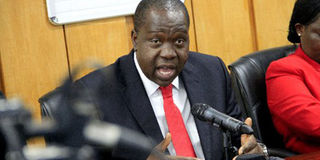‘Matiang’i Rules’ are harmful to learning and should be discarded

Fred Matiang'i, the Cabinet Secretary for the Ministry of Education, Science and Technology, at the National Treasury Building in Nairobi on July 4, 2016. PHOTO | DIANA NGILA | NATION MEDIA GROUP
What you need to know:
- With the kind of reforms fronted by Cabinet Secretary Fred Matiang’i and company, Kenya would lose all gains recorded so far in basic education.
- School performance gravitates around sound leadership driven by well-crafted policies. We don’t improve school systems by framing rules and regulations that stifle learning. No way.
- It is embarrassing to lose schools’ infrastructure worth millions of shillings through arson.
If the recent move by the Ministry of Education, Science and Technology to adjust school term dates and bar parents and guardians from visiting their sons and daughters to stem examination cheating is part of the wide ranging reforms in the Education sector, then we can correctly state that it is bound to fan more student unrest in schools.
The changes, now referred to as “Matiang’i Rules”, are bound to impact negatively on the future of the Kenyan child as they have shattered learners’ hopes and aspirations in many ways and at every level of basic education.
The abrupt and haphazard manner and style in which Education, Science and Technology Cabinet Secretary Fred Matiang’i pushed through the contentious term dates that touch on the lives of millions of children without consulting educationalists and psychologists, is suspect and a major cause for concern.
The new rules on the revised term dates, examinations schedule and banning social activities including prayers, particularly in Third Term, in the name of fighting exam cheating are already affecting the children, non-candidates included, psychologically.
The unrest we are witnessing currently is as a result of tension caused by the abrupt changes.
Learners and their parents and guardians are being bombarded with circulars and memos to the effect that the school term dates have been reorganised. Second Term has been elongated and Third Term shortened to a worrying level, making it impossible for teachers to comprehensively cover the syllabus as required by both the Kenya Institute of Curriculum Development and the Kenya National Examinations Council (Knec).
The CS, while changing the dates, forgot to consider the repercussions of having long (two months) December holidays, which are bound to expose learners to negative influences.
He naively talks of coming up with rules aimed at ensuring unnecessary contact between candidates and outsiders during examination period, forgetting that 63 per cent of learners are day scholars, and majority of teachers and the support staff live outside the school compound.
The argument that outsiders would aid exam cheating is, therefore, misplaced, hollow and laughable. Exam cheating begins at Knec and ends at the police armouries.
Half term breaks, prayer and thanksgiving days, exam period and term dates were all arrived at after thoughtful consultations in the first instance.
The most logical argument supported by Canadian researcher, Prof Michael Fullan, is that Kenya needs a “Balanced School Calendar” which has no adverse effects on learners and their teachers, as it has been the case before the introduction of the new rules. It’s against this backdrop that we call for unconditional review of the new term dates.
The Balanced School Calendar, as practised in Britain, US, India, Japan, populous China and other nations, creates direct bearing on good performance of learners by assisting teachers to adequately cover the syllabus.
Prof Ernest R. Jackson of Georgia University (2007), too says, the Balanced School Calendar creates harmony between learners, teachers, school management and parents.
It is important to note that Balanced School Calendar makes school more engaging and entertaining. We are advocating a system that would accelerate school improvement and foster each students’ unique potential and help young people use their minds well.
With the kind of reforms fronted by Matiang’i and company, Kenya would lose all gains recorded so far in basic education.
School performance gravitates around sound leadership driven by well-crafted policies. We don’t improve school systems by framing rules and regulations that stifle learning. No way.
We, therefore, call on the CS to reverse the directive on the new term dates, and instead embrace dialogue with the stakeholders on how best to stem examination cheating. It is embarrassing to lose schools’ infrastructure worth millions of shillings through arson.
Wilson Sossion is secretary-general of the Kenya National Union of Teachers; [email protected].





